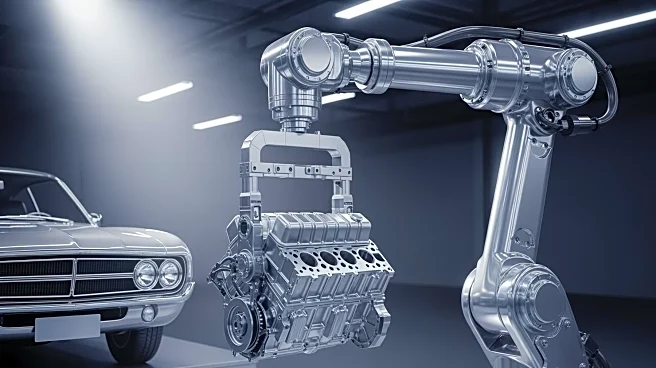What's Happening?
Ford Motor Company, under the leadership of CEO Jim Farley, is grappling with the financial impact of tariffs imposed by President Trump. These tariffs have significantly affected Ford's operations, as
the company imports many parts necessary for vehicle production. Farley highlighted that if Ford were to use only American-made parts, the cost of vehicles would become prohibitive for many consumers. The tariffs, which can reach up to 70% on certain parts, have resulted in a $2 billion expense for Ford, equating to about 20% of its global profit. Despite these challenges, Ford remains committed to American manufacturing, employing the most hourly workers in the U.S. and producing a significant portion of its vehicles domestically.
Why It's Important?
The tariffs present a substantial challenge to Ford and the broader U.S. automotive industry, which relies on a global supply chain. The financial burden of these tariffs could lead to increased vehicle prices, affecting consumer affordability and potentially reducing sales. This situation underscores the tension between promoting domestic manufacturing and the realities of global trade dependencies. The tariffs also highlight the broader economic implications for American workers, as companies like Ford navigate these financial pressures while striving to maintain employment levels.
What's Next?
Ford is adapting to these challenges by pivoting towards smaller, more affordable electric vehicles, a strategy influenced by the competitive threat posed by Chinese electric vehicles. CEO Jim Farley is actively engaging in strategies to enhance Ford's competitiveness, including exploring partnerships to improve the company's charging network. These efforts are part of a broader transformation aimed at securing Ford's future in a rapidly evolving automotive landscape.
Beyond the Headlines
The situation at Ford reflects broader economic and political dynamics, including the impact of trade policies on American industries and the ongoing shift towards electric vehicles. The company's response to these challenges could influence industry trends and policy discussions around trade and manufacturing. Additionally, Ford's commitment to maintaining its workforce amidst these pressures highlights the social responsibility aspect of corporate leadership in times of economic uncertainty.









